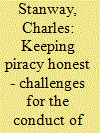| Srl | Item |
| 1 |
ID:
086165


|
|
|
|
|
| Publication |
2009.
|
| Summary/Abstract |
The epidemic of piracy off the coast of Somalia since 2007 included the spectacular pirating in November 2008 of the Saudi supertanker Sirius Star containing a quarter of Saudi Arabia's daily oil production; the ship was released on 10 January 2009 in exchange for a $3 million ransom. The epidemic has led to extensive media commentary, a flurry of UN Security Council resolutions, and deployment of an unusual combination of some of the world's most powerful navies to escort commercial ships through one of the world's busiest, and now most dangerous, shipping lanes.
Predictably, policymakers, pundits and politicians have sought to harness the piracy story to advance their own agendas. Many have seized on it to plead for a durable political solution to the 19-year crisis of state collapse in Somalia. This is a waterborne variation on the 'securitisation' of state-building, the argument that failed states pose a host of spillover dangers, including piracy, if left unresolved. Humanitarians have contrasted the robust international anti-piracy response with the tepid global mobilisation to address Somalia's horrific humanitarian crisis, in which three million Somalis are in need of emergency aid. Some apologists have cast Somali piracy in 'Robin Hood' terms, as a legitimate local response by poor coastal fishing communities against external predators engaged in illegal fishing and toxic-waste dumping in their waters. More than a few journalists have framed the Somali piracy story as another example of 'Mad Max anarchy' prevailing in the hopelessly ungovernable place called Somalia. Still others warn that it is only a matter of time before the pirates fire on a ship laden with chemicals or fuel, producing an environmental disaster on Somalia's shoreline. And counter-terrorism experts have expressed concern over a 'terrorism-piracy nexus' in which some of the tens of millions of dollars of ransom money flowing into Somalia are being garnered by the al-Qaeda affiliate in Somalia known as al-Shabaab. What all of these perspectives share is the claim that Somali piracy is only a symptom of a much bigger political problem on land.
|
|
|
|
|
|
|
|
|
|
|
|
|
|
|
|
| 2 |
ID:
085033


|
|
|
| 3 |
ID:
092098


|
|
|
|
|
| Publication |
2009.
|
| Summary/Abstract |
Piracy has been a significant issue in the region of the Horn of Africa for some time. In 2000 the problem was bad enough for the International Maritime Bureau (IMB) to regard all areas within 320km of the Somali coast as no-go zones to be avoided at all times unless exceptional precautions were taken.
|
|
|
|
|
|
|
|
|
|
|
|
|
|
|
|
| 4 |
ID:
092100


|
|
|
|
|
| Publication |
2009.
|
| Summary/Abstract |
What ho readers! It is the oddest events that make one sit up and pay attention.For me it was Jim Naughtie musing, a few morning ago, that it was easier to believe the words of Colonel Gaddaffi than Gordon Brown.
|
|
|
|
|
|
|
|
|
|
|
|
|
|
|
|
| 5 |
ID:
140158


|
|
|
|
|
| Summary/Abstract |
The association of Russia, Brazil, India, China, and South Africa (BRICS) has completed the full cycle of presidencies, and this year it is Russia's turn to host the summit. Why do we need this organization? Have we got from it what we wanted? In Russia, analysts are largely unanimous on the tasks faced by the five-member alliance. Executive Director of Russia's National Committee for BRICS Studies Georgy Toloraya, in his article "Why Does Russia Need BRICS?," indicated that the first objective of the association was to reform international financial institutions; the second one, to create mechanisms for maintaining security; and the third one, to facilitate inter-civilizational interaction.
|
|
|
|
|
|
|
|
|
|
|
|
|
|
|
|